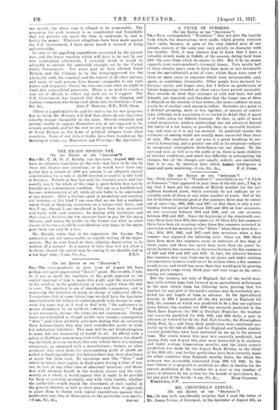[TO THE EDITOR OT THE SPECTATOR."J
Sin,—The correspondents in your issue of August 4th have perhaps not quite appreciated " Zero's" point. His trouble, I take it. is not so much the smallness of the profit expected as the capital required of him to snake this profit, and the uncertainty in his mind as to the productivity of such capital when the war is over. The question is one of considerable consequence, and is engrossing the attention of many in charge of industrial affairs. I conjecture that at some future time we shall have the Spectator concerned with the fallacy of confusing profit with income in some- what the same way ns it used to deal with " the endeavours to secure abundance by an artificial creation of scarcity "! Profit is not necessarily laconic—the terms are not synonymous. Certain taxes are calculated as though profits were income; consequently "Zero" and others probably anticipate finding that on reviewing their balance-sheets they may have considerable assets in kind, but substantial liabilities. This may well be not disadvantageous to some, but not necessarily of benefit to all. An official with a eatery of £5,000 per annum may view with equanimity a tax absorb- ing one-third, or even one-half, this sum (whilst there is a national emergency), as compared with a manufacturer, farmer, or other producer, who often finds his corresponding profit of £5,000 ab- sorbed in fixed expenditure—his balnnce-sheet may show abundance of assets but little cash. To encourage men like " Zero " and others to invest their capital in fixed assets during a time of war (or, in fact, at any other time of abnormal taxation), and there- fore with ultimate benefit to the working classes and the com- munity as a whole, it would appear that it ought to be possible for them to ascertain promptly, and with little trouble, whether the authorities would regard the investment of such capital in the general interest, as well as their own; and then, if approved, to allow them to charge such capital expenditure against their profits over one, two, or three years, as the particular case merits.


























 Previous page
Previous page